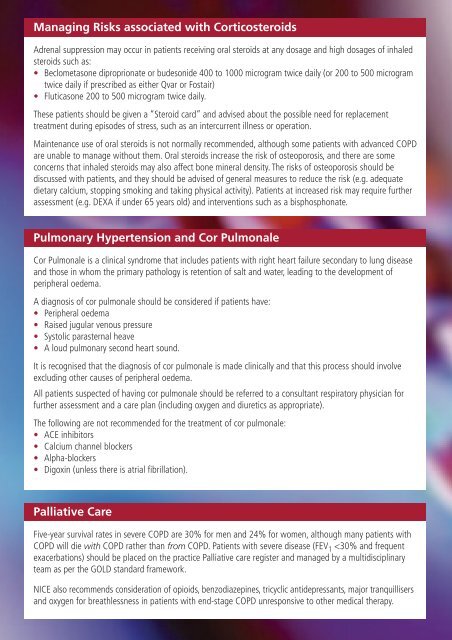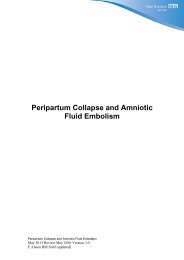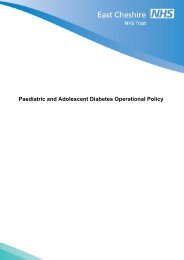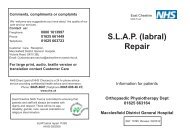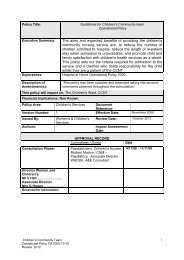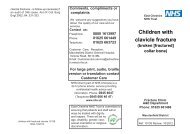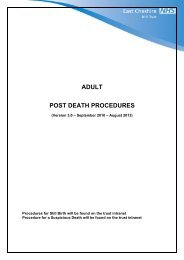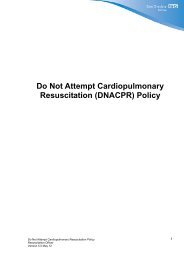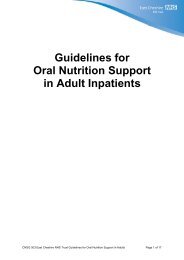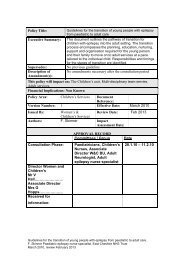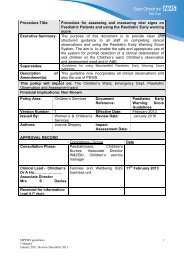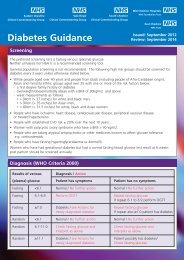Chronic Obstructive Pulmonary Disease (COPD) - East Cheshire ...
Chronic Obstructive Pulmonary Disease (COPD) - East Cheshire ...
Chronic Obstructive Pulmonary Disease (COPD) - East Cheshire ...
You also want an ePaper? Increase the reach of your titles
YUMPU automatically turns print PDFs into web optimized ePapers that Google loves.
Managing Risks associated with CorticosteroidsAdrenal suppression may occur in patients receiving oral steroids at any dosage and high dosages of inhaledsteroids such as:• Beclometasone diproprionate or budesonide 400 to 1000 microgram twice daily (or 200 to 500 microgramtwice daily if prescribed as either Qvar or Fostair)• Fluticasone 200 to 500 microgram twice daily.These patients should be given a “Steroid card” and advised about the possible need for replacementtreatment during episodes of stress, such as an intercurrent illness or operation.Maintenance use of oral steroids is not normally recommended, although some patients with advanced <strong>COPD</strong>are unable to manage without them. Oral steroids increase the risk of osteoporosis, and there are someconcerns that inhaled steroids may also affect bone mineral density. The risks of osteoporosis should bediscussed with patients, and they should be advised of general measures to reduce the risk (e.g. adequatedietary calcium, stopping smoking and taking physical activity). Patients at increased risk may require furtherassessment (e.g. DEXA if under 65 years old) and interventions such as a bisphosphonate.<strong>Pulmonary</strong> Hypertension and Cor PulmonaleCor Pulmonale is a clinical syndrome that includes patients with right heart failure secondary to lung diseaseand those in whom the primary pathology is retention of salt and water, leading to the development ofperipheral oedema.A diagnosis of cor pulmonale should be considered if patients have:• Peripheral oedema• Raised jugular venous pressure• Systolic parasternal heave• A loud pulmonary second heart sound.It is recognised that the diagnosis of cor pulmonale is made clinically and that this process should involveexcluding other causes of peripheral oedema.All patients suspected of having cor pulmonale should be referred to a consultant respiratory physician forfurther assessment and a care plan (including oxygen and diuretics as appropriate).The following are not recommended for the treatment of cor pulmonale:• ACE inhibitors• Calcium channel blockers• Alpha-blockers• Digoxin (unless there is atrial fibrillation).Palliative CareFive-year survival rates in severe <strong>COPD</strong> are 30% for men and 24% for women, although many patients with<strong>COPD</strong> will die with <strong>COPD</strong> rather than from <strong>COPD</strong>. Patients with severe disease (FEV 1


